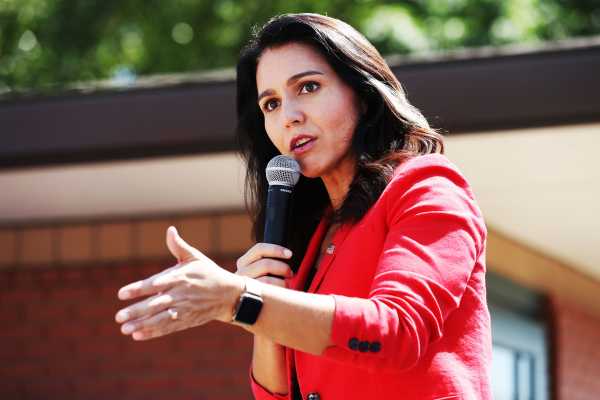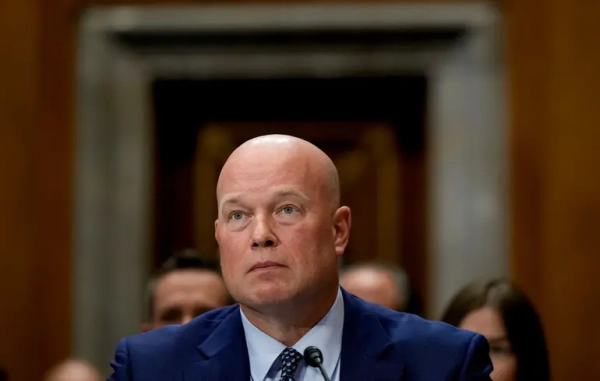
Hawaii Rep. Tulsi Gabbard’s longshot presidential bid is over.
Gabbard’s decision to drop out, announced March 19, was long in the works. She had consistently averaged around 1 to 2 percent in national polls and performed poorly in primaries; her candidacy largely served as a single-issue protest run against American military adventurism rather than a serious bid for the presidency. Her most notable moment, a devastating attack on California Sen. Kamala Harris’s record as a prosecutor in the CNN’s July debate, didn’t move the dial much in her favor. So on Thursday, March 19, she dropped out and endorsed Joe Biden for president.
The irony is that Gabbard could have been a real contender. She’s a strong communicator with an interesting biography, an Iraq war veteran and the first Hindu member of Congress. Yet thanks to a series of choices she had made since getting elected to Congress in 2012 — most notably an inexplicable trip to Syria to meet the country’s murderous leader Bashar al-Assad — she managed to alienate herself from Democratic Party’s leadership and base. Her continued ties to a strange religious group called “Science of Identity” didn’t help matters either, nor did frequent clashes with the party elite during the 2020 campaign (including filing a lawsuit against Hillary Clinton).
The result is that Gabbard’s campaign never had much of a chance: She was unable to play a significant role in the Democratic primary, even on her single issue of opposing wars of regime change, due to her past missteps. She stayed in the race for a long time, but accomplished very little.
Gabbard was once seen as a rising star in the Democratic Party
When Gabbard was first elected to Congress in 2012 amid an ocean of positive press, the Iraq War veteran seemed like a sure thing for a 2020 presidential run. Nancy Pelosi called her an “emerging star”; MSNBC’s Rachel Maddow predicted she was “on the fast track to being very famous.”
During her first campaign, she managed to successfully apologize for a history of anti-LGBT and anti-abortion stances, situating herself as an economic progressive and a critic of the Bush-era wars in the Middle East. The latter was particularly important, as she grounded her antiwar arguments in her personal experience witnessing the cost of war. This immunized her from the “soft on terrorism” charges so many Democrats have been afraid to receive, making her a powerful critic of “nation building” and “wars of choice.”
Another famous biracial Hawaiian politician, President Barack Obama, endorsed her congressional run. After her victory, Gabbard was given one of five vice chair positions on the Democratic National Committee, a sign of the party’s faith in her. Another rising star, then-Newark Mayor Cory Booker, told Vogue in 2013 that “she’s one of the leading voices in the party now.”
A presidential campaign, then, should not have been so short-lived, even in a crowded field as crowded as the 2020 Democratic one. But the positions she took in Congress on foreign policy and various authoritarian leaders — particularly Syria’s Assad — were too much for the party to overcome.
How Gabbard fell from grace
Gabbard’s decline came in a peculiar fashion: She picked a series of high-profile fights with the Obama administration over foreign policy.
In 2015, terrorism was arguably the biggest fight in American partisan politics. ISIS had just swept across northern Iraq, seizing control of the country’s second-largest city; the Obama administration had launched a new war in Iraq to roll them back.
Republicans blamed Obama. One of the most common arguments from Republicans in the run-up to that year’s midterm election was that Obama refused to say the phrase “radical Islam,” arguing that the president’s commitment to political correctness was preventing him from identifying the root cause of jihadist violence: Islamist theology.
Very few Democrats were willing to echo the Republican arguments on this front. Gabbard was an exception. As early as January 2015, she started going on every cable channel that would have her — including Fox News — and bashing Obama’s policy on terrorism. She sounded indistinguishable from a Republican presidential candidate.
“What is so frustrating … is that our administration refuses to recognize who our enemy is,” she said in a January 2015 interview with CNN’s Wolf Blitzer. “And unless and until that happens, then it’s impossible to come up with a strategy to defeat that enemy. We have to recognize that this is about radical Islam.”
The problem with this argument, according to both the Obama administration and most terrorism experts, is that “radical Islam” paints with too broad a brush. The term implies that jihadist militants are part of a unified ideological movement rather than a series of discrete groups that are often at war with each other. It’s also insulting to the vast majority of Muslims around the world. President George W. Bush’s counterterrorism team refused to use it for these reasons.
This overwhelming focus on the threat from terrorism culminated in what’s now Gabbard’s most infamous policy position: quasi-support for Syrian President Bashar al-Assad, the dictator responsible for the outbreak of the Syrian civil war and the conflict’s worst atrocities.
Gabbard argued, along with a small minority of foreign policy analysts, that the best way to defeat ISIS in Syria was for the US to align itself with Assad’s regime. She argued that the US should cut funding to the rebels fighting Assad, even sponsoring a bill in Congress to cut off US support. In the fall of 2015, when Russia began its bombing campaign in Syria, Gabbard celebrated it as a win for counterterrorism.
In fact, Russian forces were mostly targeting Syrian rebel groups overall rather than al-Qaeda-aligned rebel groups specifically. The goal was not narrow counterterrorism but rather defending a Russian-friendly regime that was (at the time) losing the war.
But there’s an internal logic here, one that the Kremlin itself has argued publicly. If you’re focused solely on the threat from the jihadist elements inside the Syrian opposition to the American homeland to the exclusion of moral concerns about Assad’s regime, then it makes a grim kind of sense to align oneself with the Syrian and Russian governments.
This appears to be how Gabbard, who once described Assad as “brutal,” could support Russia’s intervention on his behalf — even going so far as to unfavorably compare Obama to Putin, a stance that was always unpopular with Democrats but became political Kryptonite in the wake of Russia’s intervention in the 2016 election:
In January 2017, she traveled to Syria and met with Assad personally, catching the Democratic leadership in Congress off guard. After returning to the US, she went on CNN and parroted the regime’s line that there was “no difference” between the mainstream anti-Assad rebels and ISIS. When Assad’s forces used chemical weapons against Syrian civilians in April 2017, Gabbard said she was “skeptical” that Assad was responsible, aligning herself with conspiracy theorists against both US intelligence and the overwhelming majority of independent experts.
Nor was Assad was not the only foreign authoritarian Gabbard praised for fighting terrorism. She issued a statement celebrating Egyptian strongman Abdel Fattah el-Sisi’s “great courage and leadership in taking on … extreme Islamist ideology” — despite Sisi taking power in a coup and massacring more than 800 peaceful protesters in a single day.
She also proposed a policy of US special forces raids around the world and even expressed a willingness to authorize torture of terrorism suspects if she were president. She referred to herself in one interview as a “dove” on regime change but a “hawk” on terrorism, neatly summarizing her actual positions.
Why Gabbard’s campaign flopped
These attacks on Obama alienated her from the party’s leadership and mainstream years before she would announce her presidential bid.
She tried courting the emerging left — going out on a limb to endorse Sen. Bernie Sanders (I-VT) in the 2016 primary — but that, too, failed to win many adherents. In 2017, the socialist publication Jacobin published a brutal takedown titled “Tulsi Gabbard Is Not Your Friend,” focusing on dispelling the myth of Gabbard as an opponent of America’s wars abroad.
In January 2019, the Intercept, a left-aligned antiwar outlet, published a deeply reported exposé on Gabbard’s ties to Hindu nationalists. Gabbard has long supported Indian Prime Minister Narendra Modi, an anti-Islam right-winger who had previously been barred from entering the US due to being personally implicated in deadly anti-Muslim riots. In turn, American Hindu supporters of Modi had become some of Gabbard’s biggest donors — including some disturbingly Islamophobic groups.
These attacks in the left press underscore how divisive a figure she is even among the party’s left wing. It’s hard to see why a faction that was troubled by Hillary Clinton’s foreign policy record would be open to someone who had engaged in borderline Islamophobic rhetoric about “radical Islam,” called for escalations in the war on terrorism, and backed anti-Islam populists and dictators abroad. Why not vote for Sanders or Sen. Elizabeth Warren, who have no such problematic records?
And that’s more or less what appeared to happen. Gabbard won over a very small minority of Democrats who found her anti-regime change message authentic, and even made some fans among anti-war libertarians. She also got some social media support from Russia’s propaganda outfit.
But to win a Democratic primary, or even merely have a decent shot in one, you need a real national base of actual Democrats. Gabbard’s record made building one more-or-less impossible, and nothing in the campaign — neither her attacks on other Democrats nor her Fox News appearances — managed to change that. Her performance in the primaries she competed in was dismal.
Gabbard has said she won’t stand for reelection in her Hawaii congressional seat nor launch a third-party bid, which means her future is now up in the air. But one thing’s for certain: Her star is a lot dimmer in national politics than it was just a few years ago.
Sourse: vox.com






